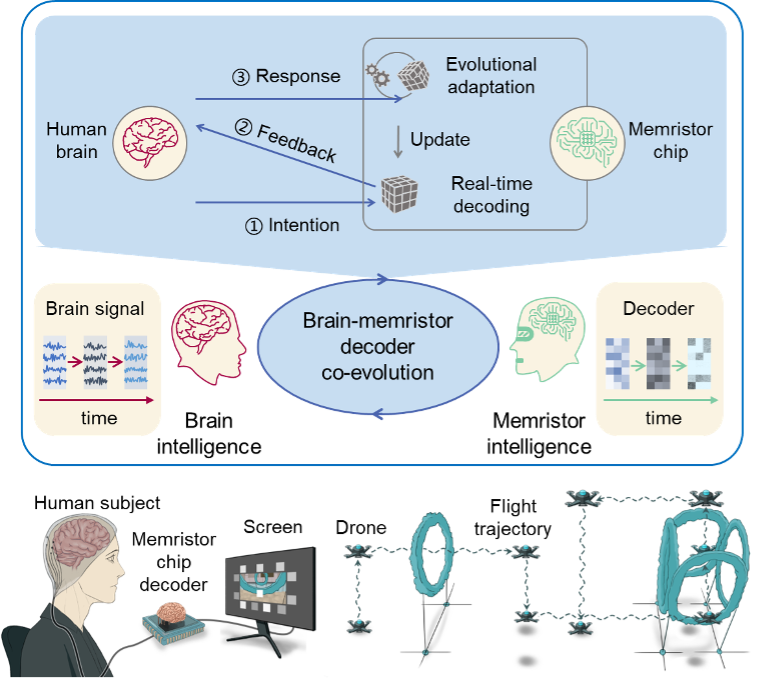Researchers from The University of Hong Kong (HKU), Tsinghua University and Tianjin University, have unveiled a groundbreaking brain-computer interface (BCI) system leveraging memristor-based neuromorphic computing to address long-standing challenges in human-machine interaction. The study, lately published in Nature Electronics in the paper titled “A memristor-based adaptive neuromorphic decoder for brain-computer interfaces”, Feb 2025, presents a pioneering solution to enhance non-invasive decoding stability and computational efficiency in BCIs, enabling real-time interaction between the human brain and external devices.

Figure 1. Memristor-based adaptive BCI for brain-controlled drone flight.
BCIs promise to revolutionize fields ranging from neuroscience to virtual reality by establishing direct communication between the brain and machines. However, decoding brain signals reliably despite neural fluctuations and processing vast neural data in energy-efficient ways have remained major obstacles.
The research team developed a 128k-cell memristor chip serving as an adaptive neuromorphic decoder for non-invasive BCIs. This hardware-efficient decoder employs a one-step memristor-based decoding strategy, achieving software-equivalent performance while consuming 1643× lower energy than conventional von Neumann computing platforms. In particular, the system demonstrated its capabilities in real-time drone control across four degrees of freedom. To ensure adaptability, the decoder integrates an interactive update framework, allowing it to co-evolve with dynamic brain signals. In a trial involving ten participants, this co-evolution mechanism boosted decoding accuracy by 20% compared to systems without interactive updates.
This breakthrough represents the first successful co-evolution between biological brains and neuromorphic memristor chips, paving the way for hybrid human-machine intelligence. The technology holds potential beyond BCIs, with applications in neuromodulation, motor rehabilitation, and virtual reality.
The research team comprises Dr. Zhengwu Liu and Prof. Ngai Wong from HKU, Prof. Jianshi Tang, Prof. Huaqiang Wu, Prof. He Qian, Prof. Bin Gao, Prof. Peng Yao and Prof. Bo Hong from Tsinghua University, Mr. Jie Mei, Prof. Minpeng Xu, Prof. Dong Ming, and Prof. Kun Wang from Tianjin University, and Professor Tzyy-Ping Jung from the University of California San Diego.
The project received support from the RGC Theme-based Research Scheme (TRS) project T45-701/22-R, the STI 2030-Major Projects, National Natural Science Foundation of China, and the XPLORER Prize.
Link to the paper: https://www.nature.com/articles/s41928-025-01340-2
Link to the video demo: https://assets-eu.researchsquare.com/files/rs-3966063/v1/7a84dc7037b11bad96ae0378.mp4
